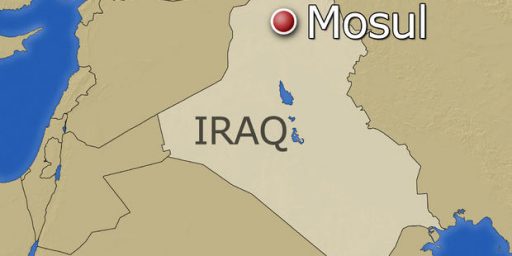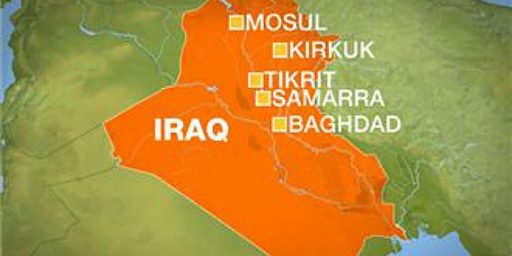Slogging Towards Victory?
Austin Bay responds to Richard Fernandez‘ observation of cognitive dissonance among the abstract blogosphere with a guess as to its cause:
[T]here’s a growing awareness that Al Qaeda is being defeated— it’s not dead but it’s on its way to defeat. Even Al Qaeda’s latest rants reflect an awareness that their great gambit has failed. Violent political Islamism isn’t defeated— but its Al Qaeda avatar is on the ropes. Let’s hope that leads to a “re-consideration of methods” by other violent political Islamists (like, drop the violent?). […] There is also a growing awareness that Iraq’s long slog may well result in the emergence of a new, more open political system in the Muslim Middle East. It’s still going to take a couple of years for this to be evident —and the worst defeatists and naysayers will either go to their graves denying it— but all of the indicators are there. The bombs still explode in Baghdad (that is what makes the 24/7 news), but the Iraqis are slowly taking political and economic control. In historical terms this is astonishing news, but it is slow news, where the evidence builds brick by brick. (Don’t write me about Shias and Kurds shooting one another— it has happened before and will happen again— the big picture is the emergence of an open political system that will deal legally and politically with deadly disputes.) The Iraqis are emerging from their civil war (that’s the way I’ve described the insurgency, pegging the start of the civil war sometime in the summer of 2003).
An excellent piece by Robert Kaplan in the April Atlantic, “The Coming Normalcy?” sounds a similar theme. It’s the story of the 25th Infantry Division’s “Lancer” brigade’s stunning but quiet success story in Mosul. A key ‘graph:
When the 1-25 “Lancers” arrived in Mosul, in September of 2004, the city and its environs were a violent no-go zone, having seen several thousand insurgent attacks, not to mention more than a thousand explosions from improvised explosive devices, or IEDs. The local police had largely deserted, dropping from an on-paper force of 10,000 to an irrelevance of 300. But by the time 1-25 left Mosul, a year later, mortar attacks alone had fallen from 300 a month to fewer than ten. Other forms of insurgent activity dropped to the point where international journalists no longer considered Mosul an important part of the ongoing Iraq story—a fact evidenced by their thin presence in the city. Meanwhile, the local police force was now back up to 9,000, and the number of police stations had expanded from five to twenty-four. More important, the number of intelligence tips called in by the local population had risen from essentially zero to some 400 per month.
The nature of the success is about changing organizational structure and tactics, devolving decision-making power to captains and senior NCOs in close concert with local Iraqi community leaders. There’s also this:
“On the other hand,” he went on, “we benefit because the international media doesn’t want to leave the greater Baghdad area. With no international media in Mosul on a regular basis, there’s been less of an incentive [for the insurgents] to do car bombings.”
Conversely, however, they’re not there to cover the peace. The presence of a large concentration of press in Baghdad simultaneously leads to an overemphasis on the violence in Iraq and actually incentivizes violence in order to get more coverage.





So years and hundreds of millions of dollars and thousands of American and 10s of thousands of Iraqi and Afghani deaths later this little band of punks is weakening? Kudos to Bush and the neocons.
Roger, what do you think the cost would have been if the Clinton method of fighting the terrorists had continued. Can you say nuke Washington DC or New York? Just in case you think this fight is over, I suggest you study the history of Islam. How it started and how it was spread. Get competent help, not some left wing apologist, then arm yourself.
Zelsdorf,
Every time Clinton did try and fight terrorists, the GOP screeched “wag the dog”. Then they tied him up with a nonsense impeachment that did zero to serve our national interest.
During the Clinton/Bush transition, the Bush team was warned that terrorism was the #1 problem they needed to focus on. Bush was focused like a laser on tax cut for billionaires, and 9-11 followed.
Oh yea, and Clinton brought the ’93 WTC bombers to justice, which is a hell of a lot more then Bush has managed with Bin Laden.
What anjin-san said, Z.
For a self-proclaimed Reagan Conservative, you sure come off like a dyed in the wool Clinton apologist…
Can you say nuke Washington DC or New York?
The irony is that nothing we have done to date really mitigates this possibility all that much, if at all. All it would take is a black market warhead and a few terrorists and presto, good-by New York.
At best the invasion of Iraq only did one thing, prevent Saddam Hussein, a secular Muslim, from developing a nuclear device, and then give it to Islamic fundamentalist terrorists and hope they actually use it on someone other then him. This whole Iraqi adventure has bought us almost nothing in terms of tangible security.
I notice Anjin-san and Roger have been high-fiving each other an awful lot lately. Do I smell a sock puppet?
Have you been drinking again, McG? What Rick said.